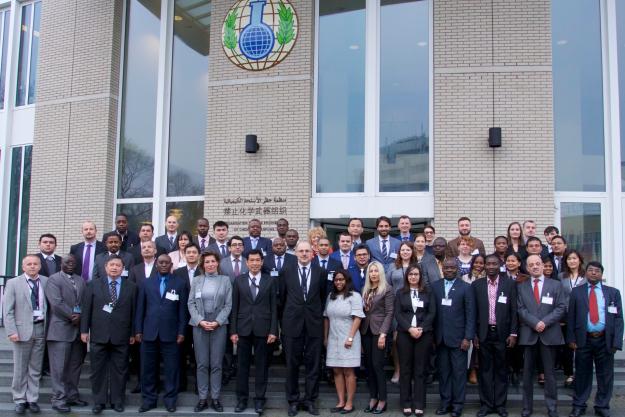
New National Authority inductees at an introductory course on implementing the Chemical Weapons Convention (CWC)
THE HAGUE, Netherlands — 19 April 2017 – New National Authority inductees went through an introductory course on implementing the Chemical Weapons Convention (CWC), during an Organisation for the Prohibition of Chemical Weapons’ (OPCW) basic course for National Authority personnel at OPCW Headquarters in The Hague, the Netherlands from 3-7 April.
“The importance of the work of National Authorities cannot be overemphasised, as they are the key players responsible for ensuring State Parties’ compliance with the Chemical Weapons Convention,” expressed in the opening remarks of Mr Hamza Khelif, Director of the International Assistance Division. He underlined that the OPCW stands ready to support National Authorities in enhancing their capacity to be successful in this mission.
The programme focused on the key tasks National Authority representatives undertake to ensure the CWC is fully implemented on a national level. Topics covered in the sessions included the role of National Authorities in the implementation of the CWC; practical exercises on the identification of declarable activities and facilities; issues, common problems and rules regarding imports and exports of scheduled chemicals; the verification regime under Article VI of the CWC; and the OPCW’s role in counter terrorism.
In light of the upcoming Fourth Review Conference to assess the operation of the CWC, presentations and discussions also touched upon present challenges facing the OPCW and its future priorities.
In addition to their training sessions, attendees were given a tour of the OPCW Laboratory and Equipment Store.
The course was attended by representatives of Albania, Angola, Algeria, Argentina, Azerbaijan, Bangladesh, Bhutan, Brazil, Burkina Faso, Burundi, Canada, Cote D’Ivoire, Cuba, Denmark, Georgia, Guatemala, India, Iran, Ireland, Italy, Jordan, Kazakhstan, Malaysia, Mali, Moldova, Morocco, Nepal, Nigeria, Paraguay, Philippines, St. Lucia, St. Kitts and Nevis, Sri Lanka, Sudan, Tajikistan, Tanzania, Thailand, Uganda, Ukraine, United States, Uruguay, Viet Nam, Zambia and Zimbabwe.
The basic course for National Authority personnel is an element of a broader educational programme offered by the OPCW to States Parties to enhance their ability to implement the CWC fully on a national level. The programme includes regular National Authority meetings, CWC educational packages and courses, and capacity building events related to implementing legislation.
Background
As the implementing body for the Chemical Weapons Convention, the OPCW oversees the global endeavour to permanently and verifiably eliminate chemical weapons. Since the Convention’s entry into force in 1997 – and with its 192 States Parties – it is the most successful disarmament treaty eliminating an entire class of weapons of mass destruction.
To date, nearly 95 per cent of all chemical weapon stockpiles declared by possessor States have been destroyed under OPCW verification. For its extensive efforts in eliminating chemical weapons, the OPCW received the 2013 Nobel Prize for Peace.
